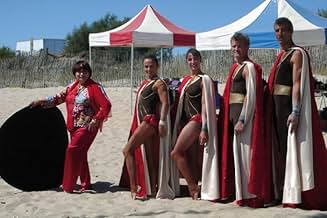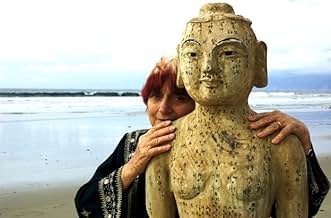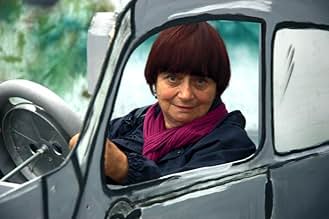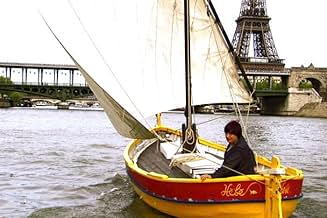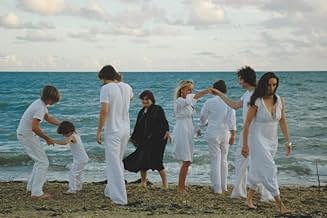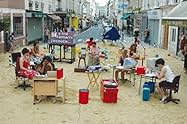Les plages d'Agnès
- 2008
- Tous publics
- 1h 52m
IMDb RATING
8.0/10
5.1K
YOUR RATING
Agnès Varda explores her memories, mostly chronologically, with photographs, film clips, interviews, reenactments, and droll, playful contemporary scenes of her narrating her story.Agnès Varda explores her memories, mostly chronologically, with photographs, film clips, interviews, reenactments, and droll, playful contemporary scenes of her narrating her story.Agnès Varda explores her memories, mostly chronologically, with photographs, film clips, interviews, reenactments, and droll, playful contemporary scenes of her narrating her story.
- Awards
- 12 wins & 13 nominations total
Gerald Ayres
- Self
- (as Gerry Ayres)
Patricia Louisianna Knop
- Self
- (as Patricia Knop)
- Director
- Writers
- All cast & crew
- Production, box office & more at IMDbPro
Featured reviews
It's not too often a filmmaker will give us a full and unambiguous autobiography on film; if we find out about who they are, he or she will bring themselves into the art that is ostensibly other stories. Agnes Varda looks back on her life using cinema and it is among the most unique things I've ever seen - though it is not inconsistent with many films she has made before (The Gleaners and I comes to mind) as far as her life being inextricably and most often joyfully being connected with her work. This doesn't mean she doesn't shy away from the pain as well; the parts regarding Jacques Demy in his final years are somber and tender.
Pure, unadulterated imagination, heart, empathy, a light yet wholly potent surrealism, a seemingly endless connection to other people, art, photography, and of course those cats (including an eccentric cameo by Chris Marker). I feel like I got a lifetime in just a little under two hours. And how about her cardboard car that she tries to park into her tiny garage!
And it's the kind of wonderful and priceless piece of autobiography that has digressions (one of which about Jim Morrison). It may help to see at least a few of her films before going into this, but even if you only have a cursory knowledge of film history or Demy or what have you, it's still effective and affecting as a story that contains many stories and is about getting us to see the world as vibrantly and daringly as she does.
As life changes and the world goes through other developments, the beaches stay the same.
Pure, unadulterated imagination, heart, empathy, a light yet wholly potent surrealism, a seemingly endless connection to other people, art, photography, and of course those cats (including an eccentric cameo by Chris Marker). I feel like I got a lifetime in just a little under two hours. And how about her cardboard car that she tries to park into her tiny garage!
And it's the kind of wonderful and priceless piece of autobiography that has digressions (one of which about Jim Morrison). It may help to see at least a few of her films before going into this, but even if you only have a cursory knowledge of film history or Demy or what have you, it's still effective and affecting as a story that contains many stories and is about getting us to see the world as vibrantly and daringly as she does.
As life changes and the world goes through other developments, the beaches stay the same.
French New Wave film-maker and photographer Agnes Varda takes a look back at her life, her career, and her loves. She tells her story mostly to camera, now 80 years old - "a little old lady, pleasantly plump" - and is still full of life and wonder. She starts with her time studying art in Ecole du Louvre, the charms of the small town near Paris where she made her first film, her relationship with and love of fellow film- maker Jacques Demy, and the beginning of the French New Wave movement, and moves on to her re-location to and seduction by Hollywood, the hippy movement, her neo-Feminist views that influenced her films, and her move into photography. Most of all though, she reminisces about the eccentrics she encountered, and the photographs that immortalise her memories.
Varda seems extremely keen to cement these memories either by recording them on her ever-present video-camera, or by taking pictures. It is important to remember, it seems. She uses a number of different artistic techniques in the film. Her wonder and love of the beaches are evident at the beginning as she lays out a number of old photographs in the sand that blow in the wind, as she reminisces. She also lays out a number of mirrors facing all angles and directions, creating some fascinating images. Varda has a clear love for art, and sees it in everything she does. As she watches a man gaze out to sea, she describes him as being like Ulysses. It is clear that it is Varda herself who is like Ulysses - life has been an epic journey for her, in which she has encountered many friends and characters, and the sea is like her life, vast and beautiful, but fading into the distance.
What is so joyous about the film is how wonderfully sentimental it is. It is not patronising or forceful by overplaying sad music or having Varda cry into the camera, but instead the beauty and the melancholy are in her words, and how she describes the first time she met Demy, or how she turned a run down alley full of empty picture frames and overhanging trees into a beautiful gateway. It is so beautifully sad yet ultimately uplifting. Varda is a wonderful and intelligent lady who's love of art and creativity shines through what appears to be a short woman with a strange haircut. Less a documentary, and more of an exploration of art, love and life seen through the eyes of a woman who has lived through the very heart of it. Lyrical, beautiful, and reminds you of the true joys to be found in cinema.
www.the-wrath-of-blog.blogspot.com
Varda seems extremely keen to cement these memories either by recording them on her ever-present video-camera, or by taking pictures. It is important to remember, it seems. She uses a number of different artistic techniques in the film. Her wonder and love of the beaches are evident at the beginning as she lays out a number of old photographs in the sand that blow in the wind, as she reminisces. She also lays out a number of mirrors facing all angles and directions, creating some fascinating images. Varda has a clear love for art, and sees it in everything she does. As she watches a man gaze out to sea, she describes him as being like Ulysses. It is clear that it is Varda herself who is like Ulysses - life has been an epic journey for her, in which she has encountered many friends and characters, and the sea is like her life, vast and beautiful, but fading into the distance.
What is so joyous about the film is how wonderfully sentimental it is. It is not patronising or forceful by overplaying sad music or having Varda cry into the camera, but instead the beauty and the melancholy are in her words, and how she describes the first time she met Demy, or how she turned a run down alley full of empty picture frames and overhanging trees into a beautiful gateway. It is so beautifully sad yet ultimately uplifting. Varda is a wonderful and intelligent lady who's love of art and creativity shines through what appears to be a short woman with a strange haircut. Less a documentary, and more of an exploration of art, love and life seen through the eyes of a woman who has lived through the very heart of it. Lyrical, beautiful, and reminds you of the true joys to be found in cinema.
www.the-wrath-of-blog.blogspot.com
The French movie Les plages d'Agnès was shown in the U.S. with the title The Beaches of Agnès (2008). It was directed by Agnès Varda.
This is a summing up movie, completed by Varda when she was 80 years old. It's really a semi-documentary, but it includes surreal elements that Varda interweaves with commentary, historical movie clips, and direct discussions with the us, the audience.
If you're an Agnès Varda fan, this movie will be perfect. If you've never seen a Varda film, it may not make much sense. Even so, it's interesting, funny, and poignant. If you're not sure, take a chance on it.
We saw the movie at the excellent Dryden Theatre in the George Eastman Museum in Rochester, NY. It was part of an Agnès Varda retrospective, cosponsored by Rochester Institute of Technology and the Eastman Museum. It will work better on the large screen, but it will be satisfactory on the small screen as well.
This is a summing up movie, completed by Varda when she was 80 years old. It's really a semi-documentary, but it includes surreal elements that Varda interweaves with commentary, historical movie clips, and direct discussions with the us, the audience.
If you're an Agnès Varda fan, this movie will be perfect. If you've never seen a Varda film, it may not make much sense. Even so, it's interesting, funny, and poignant. If you're not sure, take a chance on it.
We saw the movie at the excellent Dryden Theatre in the George Eastman Museum in Rochester, NY. It was part of an Agnès Varda retrospective, cosponsored by Rochester Institute of Technology and the Eastman Museum. It will work better on the large screen, but it will be satisfactory on the small screen as well.
Granted, I am a huge fan of Agnès Varda's work—and persona. I've seen most of her American releases, which are, unfortunately, far fewer than the 46 films she's directed. Sorry to report that even Netflix only stocks 8 of her films; my local video store and library system, not even 1.
Eighty-one-year-old Varda is, first and foremost, a poet who happens to be holding a video camera. And with this, her autobiography, she quickly brings us into the stream of consciousness of her brilliant mind, regaling us with both fantastic images, filmic experiments, and words rendered so quietly and sweetly that it belies their utter veracity. With the fluidity of a Russian ballerina, she weaves still photos, clips from her films, present- day documentary footage, and fictional re-creations.
A viewer with a familiarity of her oeuvre will obviously take away greater understanding and enjoyment of this recounting of her life and work. Yet, I believe it's accessible even for the uninitiated, as a tribute to an artist and iconoclast who sustains a strong vision and keen insight into life and art. And a great big heart.
" 'If we opened up people, we'd find landscapes.' If we opened up me, we'd find beaches," she begins, an apt conceit for the half-Greek filmmaker who has lived her life near the sea. And thus, in the film's opening shots, she constructs a web of mirrors propped on easels in the sand, reflecting the incoming waves. These are fancy, gilded, furniture mirrors, large and small, capturing both la plage and Varda's reflection as she begins the narrative of her childhood. In and of itself, it's a beautiful installation piece—greatly enhanced by the reflexive quality of a sea of cameras filming themselves.
Moments later, she sets up family photos on blades of grass in the sand. While discussing an image of herself and her sister in their bathing suits, two little girls appear in current time, wearing the same sorts of suits. "I don't know what it means to re-create a scene like this. Do we relive the moment?" Varda wonders. But her answer seems less about reconstructing the past (this is not a wistful film like Bergman's Wild Strawberries), but more about delight in her powers as a magician with a camera. "For me, it's cinema, it's a game," she says.
Some of the film's sweetest moments derive from shots of her family—her two children and late-husband, fellow New Wave auteur Jacques Demy (The Umbrellas of Cherbourg). She obviously has great affection for the "peaceful island," as she describes them. In one lovely scene, the extended family is dressed in white gauze, frolicking. "Together they're the sum of my happiness. But I don't know if I know them, or understand them. I just go toward them."
Varda employs an unusual technique of re-creating the major moments of her life/films while bringing her current self into the proceedings. In the age of social networking a la Facebook, with gambits toward entering the past as we simultaneously dwell in the present, this seems a very contemporary notion. With the gift of memory, we both do and don't inhabit all of the times of our life at once. As she states, "I live. And as long as I live, I remember."
One of La Varda's most lovable traits is how utterly herself she can be. Her 8-decade-old hair sports its trademark bowl cut, yet in some scenes is colored almost parfait-like (sans cerise) with white on top and deep red around the ends—gloriously unconventional, and wry. And indeed her sense of humor is continually present. She also has the good sense not to take herself completely seriously. After revisiting her early home in Brussels and discovering that it is now inhabited by an avid train enthusiast who prattles on about his collection, she concludes, "The 'childhood home' part was a flop."
In 55 years of making films, the director has clearly spent ample time pondering the art of her craft. As she notes, "I think I've always lived in it." This is obviously so, and without traditional tutelage. She claims to have made her directorial debut, La Pointe-Courte, after having taken in just 10 films in her first 25 years. This greatly flouted convention within French film-making of the time, in which training and credentials were paramount. Much of the film concerns images and the context of their creation— the process of birthing, what prompts images into being, the results of their existence, the ripple effects of the filmmaker's art, and the inextricable link between maker and film.
Although Varda includes reenactments in this walk backward, she also allows the viewer to be in on their making. It's as if she hopes to underscore the artifice and revels in the fact that we will knowingly suspend our disbelief anyway. In one scene, she sets up a production office atop sand dumped on a city street.
The movie's final scene reveals Varda's "shack," a studio she's recently built on the beach. The filmmaker-as-architect metaphor made real, its walls are constructed of strips of celluloid from a 1966 film in carefully chosen colors, bathed in light. The structure is fragile yet appears solid. This is a wondrous metaphor, one that seems to encapsulate the artist's spirit and life. "In here, it feels like I live in cinema," she notes.
Eighty-one-year-old Varda is, first and foremost, a poet who happens to be holding a video camera. And with this, her autobiography, she quickly brings us into the stream of consciousness of her brilliant mind, regaling us with both fantastic images, filmic experiments, and words rendered so quietly and sweetly that it belies their utter veracity. With the fluidity of a Russian ballerina, she weaves still photos, clips from her films, present- day documentary footage, and fictional re-creations.
A viewer with a familiarity of her oeuvre will obviously take away greater understanding and enjoyment of this recounting of her life and work. Yet, I believe it's accessible even for the uninitiated, as a tribute to an artist and iconoclast who sustains a strong vision and keen insight into life and art. And a great big heart.
" 'If we opened up people, we'd find landscapes.' If we opened up me, we'd find beaches," she begins, an apt conceit for the half-Greek filmmaker who has lived her life near the sea. And thus, in the film's opening shots, she constructs a web of mirrors propped on easels in the sand, reflecting the incoming waves. These are fancy, gilded, furniture mirrors, large and small, capturing both la plage and Varda's reflection as she begins the narrative of her childhood. In and of itself, it's a beautiful installation piece—greatly enhanced by the reflexive quality of a sea of cameras filming themselves.
Moments later, she sets up family photos on blades of grass in the sand. While discussing an image of herself and her sister in their bathing suits, two little girls appear in current time, wearing the same sorts of suits. "I don't know what it means to re-create a scene like this. Do we relive the moment?" Varda wonders. But her answer seems less about reconstructing the past (this is not a wistful film like Bergman's Wild Strawberries), but more about delight in her powers as a magician with a camera. "For me, it's cinema, it's a game," she says.
Some of the film's sweetest moments derive from shots of her family—her two children and late-husband, fellow New Wave auteur Jacques Demy (The Umbrellas of Cherbourg). She obviously has great affection for the "peaceful island," as she describes them. In one lovely scene, the extended family is dressed in white gauze, frolicking. "Together they're the sum of my happiness. But I don't know if I know them, or understand them. I just go toward them."
Varda employs an unusual technique of re-creating the major moments of her life/films while bringing her current self into the proceedings. In the age of social networking a la Facebook, with gambits toward entering the past as we simultaneously dwell in the present, this seems a very contemporary notion. With the gift of memory, we both do and don't inhabit all of the times of our life at once. As she states, "I live. And as long as I live, I remember."
One of La Varda's most lovable traits is how utterly herself she can be. Her 8-decade-old hair sports its trademark bowl cut, yet in some scenes is colored almost parfait-like (sans cerise) with white on top and deep red around the ends—gloriously unconventional, and wry. And indeed her sense of humor is continually present. She also has the good sense not to take herself completely seriously. After revisiting her early home in Brussels and discovering that it is now inhabited by an avid train enthusiast who prattles on about his collection, she concludes, "The 'childhood home' part was a flop."
In 55 years of making films, the director has clearly spent ample time pondering the art of her craft. As she notes, "I think I've always lived in it." This is obviously so, and without traditional tutelage. She claims to have made her directorial debut, La Pointe-Courte, after having taken in just 10 films in her first 25 years. This greatly flouted convention within French film-making of the time, in which training and credentials were paramount. Much of the film concerns images and the context of their creation— the process of birthing, what prompts images into being, the results of their existence, the ripple effects of the filmmaker's art, and the inextricable link between maker and film.
Although Varda includes reenactments in this walk backward, she also allows the viewer to be in on their making. It's as if she hopes to underscore the artifice and revels in the fact that we will knowingly suspend our disbelief anyway. In one scene, she sets up a production office atop sand dumped on a city street.
The movie's final scene reveals Varda's "shack," a studio she's recently built on the beach. The filmmaker-as-architect metaphor made real, its walls are constructed of strips of celluloid from a 1966 film in carefully chosen colors, bathed in light. The structure is fragile yet appears solid. This is a wondrous metaphor, one that seems to encapsulate the artist's spirit and life. "In here, it feels like I live in cinema," she notes.
Agnès Varda presented us in this autobiographical movie with her memories of a life devoted to the cinema and not only. She does that in powerful and beautiful images supported by a brilliant, witty and sensitive commentary. In this movie we can see references to several of some of the best Varda's films such as La Pointe Courte, Cléo de 5 à 7 and Le Bonheur, with images, and to some of the greatest and more important figures of French cinema such as her husband Jacques Demy to begin with and also Godard, Catherine Deneuve, Michel Piccoli, Jane Birkin and others. The cut is very intelligent and effective in visual terms combining the present and the past sometimes in simultaneous images with a special effect here and there. A masterpiece indeed.
Did you know
- TriviaFrench visa # 118156.
- ConnectionsEdited into Film socialisme (2010)
- How long is The Beaches of Agnès?Powered by Alexa
Details
- Release date
- Country of origin
- Official sites
- Languages
- Also known as
- The Beaches of Agnès
- Filming locations
- Production companies
- See more company credits at IMDbPro
Box office
- Budget
- €1,900,000 (estimated)
- Gross US & Canada
- $239,711
- Opening weekend US & Canada
- $19,032
- Jul 5, 2009
- Gross worldwide
- $2,235,006
- Runtime1 hour 52 minutes
- Color
- Aspect ratio
- 1.85 : 1
Contribute to this page
Suggest an edit or add missing content


![Watch Bande-annonce [OV]](https://m.media-amazon.com/images/M/MV5BZGYxNzE1MDgtYjIzMy00NmY0LTkyMmItMTFkZjVlNmMyNTVmXkEyXkFqcGdeQXRyYW5zY29kZS13b3JrZmxvdw@@._V1_QL75_UX500_CR0)



